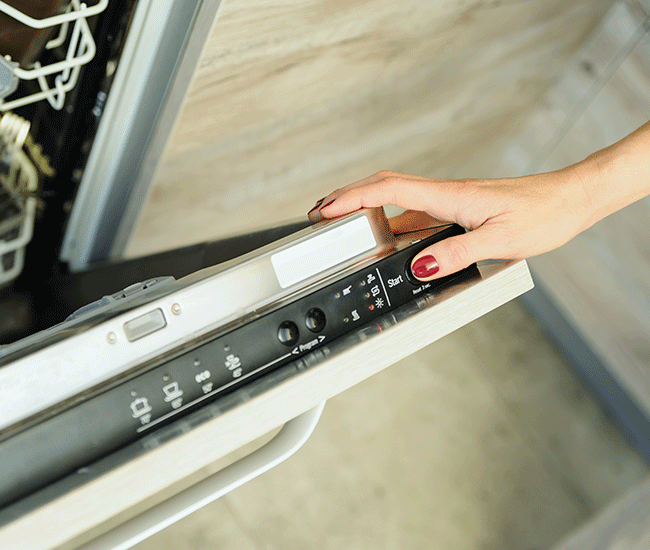

The dishwasher isn’t washing properly: you’ve known about it for a while, but you don’t understand why! Your glasses are cloudy, unpleasant dried food remains on your cutlery, and your pans are still dirty. What’s going on? It isn’t always easy to understand at first glance…
There can be many reasons behind an inefficient dishwasher. Let’s have a look at the most common ones, all fixable without calling an(expensive) technician!
It happens that at the end of a wash, glassware comes out rough, cloudy, and stained. Glass can lose its shine because of two things. The first is corrosion: the glasses are permanently damaged. The causes of this can be: high temperatures, low glass quality, wear and tear over time. In this case, there is no remedy, and you will just have to replace them.
Scale on glasses, however, is the most common cause! In this case, you can take action. Check if there is enough salt in the dishwasher.
Salt is needed to help water softeners work properly. This is the device responsible for “digesting” the scale in the water. Rinse aid is also needed to protect dishes from scale, but be careful! if it is included in your detergent, you shouldn’t add more.
If you open the dishwasher at the end of a wash and notice water sitting on the bottom, it means that there is a problem. The dishwasher is not draining properly. You will probably also notice food residues on the dishes and a bad smell. What is the cause of this problem?
It could be that the filter is dirty, blocked with a thick coating of grease and food residues. Slide it out from its position and give it a deep clean.
If the problem appears again, check the drainage pipe. It can get blocked by toothpicks, lemon seeds, paper labels from jars, or pieces of plastic.
You will certainly have noticed them. In the dishwasher, there are two blades full of nozzles. When the dishwasher is on, blades spin and spray water from the nozzles.
Therefore, the spray arms can move freely and are not blocked by anything. When you load the dishwasher, check if they can move by spinning them. If they hit against lids, ladles, or pans, change the position of your kitchenware.
However, another problem could be that the holes are plugged. If the dishwasher is not washing properly, check if the holes in the blades are not blocked by little pieces of paper, food residues, or grease. Remove the blades and wash them with hot water, using a thin, pointed object to clear the holes (like a metal paper clip).
SEE ALSO: Dishwasher: 5 myths debunked for cleaner dishes!
You turn on the dishwasher, and everything seems to be working as usual, but suddenly it stops. Inside there is no sign of water. Before calling a technician or taking it apart yourself, check if the water tap is on!
It may seem like a simple solution, but it happens more often than you think. However, dishwashers are intelligent appliances, and they also don’t fill up with water if there is something wrong. If you come across this problem, check if the door is properly closed and if the water pipe is not squashed, knotted, or blocked.
To prevent the most common problems that stop dishwashers from working, you need to carry out regular maintenance.
